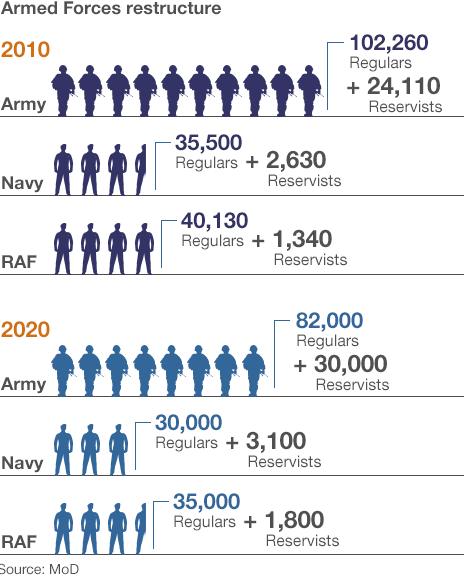1,500 UK forces personnel to go in latest military cuts
- Published
Maj Gen David Cullen: Cuts are the "beginning of the end of uncertainty"
Some 1,500 personnel are to lose their jobs in the armed forces' fourth and final round of redundancies as part of defence cuts announced in 2010.
Defence Secretary Philip Hammond said 1,425 will come from the Army, 70 from the RAF and 10 from the Royal Navy.
Mr Hammond told the Commons the decisions were "painful" but Britain's security would not be put at risk.
Personnel currently serving or about to serve in Afghanistan will be exempt, while the Ghurkas face cuts.
Shadow defence secretary Vernon Coaker said the government was "taking risks with Britain's safety and security" by pressing ahead with latest job cuts.
The Army is cutting the number of regulars from 102,000 in 2010 to 82,000 by 2017, but seeking to increase the number of reservists.
The plans also involve cutting the Royal Navy from 35,500 regulars in 2010 to 30,000 in 2020 and the RAF from 40,130 regulars in 2010 to 35,000 in 2020.
The Gurkhas will be cut because they currently have too many personnel, the defence secretary said.
Mr Hammond told the Commons that the completion of the cuts marked a turning point, meaning the remaining personnel could "enjoy peace of mind" that a period of restructuring was over.
He said: "Our personnel will have certainty about the future size and shape of our armed forces, and confidence that they will have the kit, equipment and platforms they need.
"Just as important, the country can have confidence that its armed forces will not only be affordable and sustainable, but among the most battle-hardened, best-equipped and best-trained forces in the world, able to ensure that Britain remains safe and secure in the world."
He said to ease the transition to civilian life, the armed forces help-to-buy scheme would be extended to personnel taking redundancy who did not have their own home.
Mr Coaker said: "Labour is clear about the need to reconfigure our armed forces after withdrawal from Afghanistan and the end of a presence in Germany. But we would never do anything that would leave Britain's security under threat."
"The government is letting down our armed forces and their families, and taking risks with our nation's safety."
The previous round of redundancies in June, totalling nearly 4,500, was the largest number of job cuts since the government began the process following the 2010 Strategic Defence and Security Review.
Of those that were made redundant, 84% applied.
Falklands War veteran Simon Weston says the cuts are "having a terrible impact on recruitment"
The head of the British army, Gen Sir Peter Wall said this final round of redundancies would end a period of significant uncertainty with the "forced exodus of people from the Army", and it could now focus on recruiting for the future.
Mr Hammond recently described army recruitment as a "big challenge", as a £3m campaign to boost regular and reserve forces was launched.
As the number of regular soldiers decreases, the government wants to boost the number of reservists from 19,000 to 30,000 - but it has so far failed to meet its targets.
Falklands veteran Simon Weston said he would not have joined the armed forces in its current form.
"I look at it now and think, 'Is it worth going in?' The way the guys were given their redundancies on the front line last year, that's some thank you for the job you have taken on, dedicated your life to, risked your life for, as many have done. I don't think I would," he said.
The government's plans to reduce armed forces personnel were criticised in recent weeks by former US defence secretary Robert Gates, who told the BBC that cuts would limit the UK's military standing.
That warning, though, was rejected by Prime Minister David Cameron, who said Britain had the world's fourth largest defence budget and was a "first-class player in terms of defence".

- Published3 July 2013
- Published16 January 2014
- Published16 January 2014
- Published11 January 2014